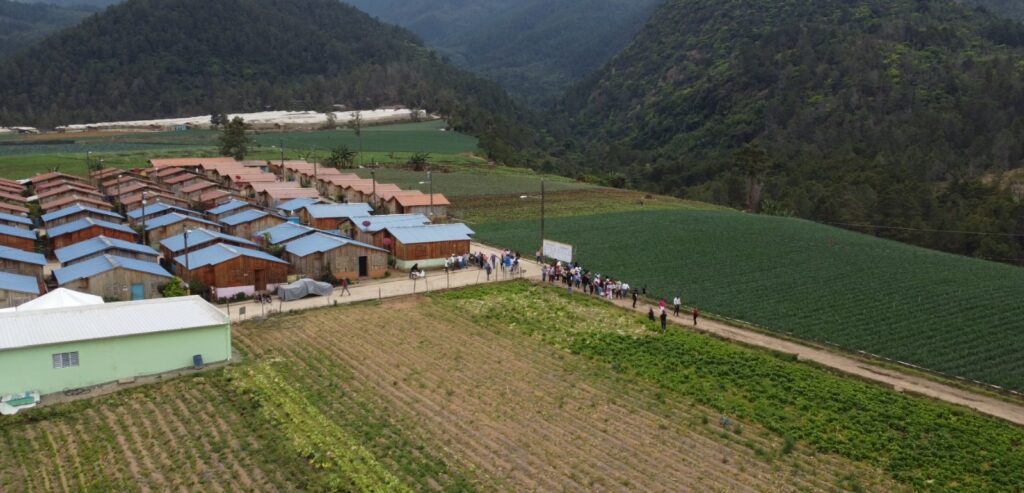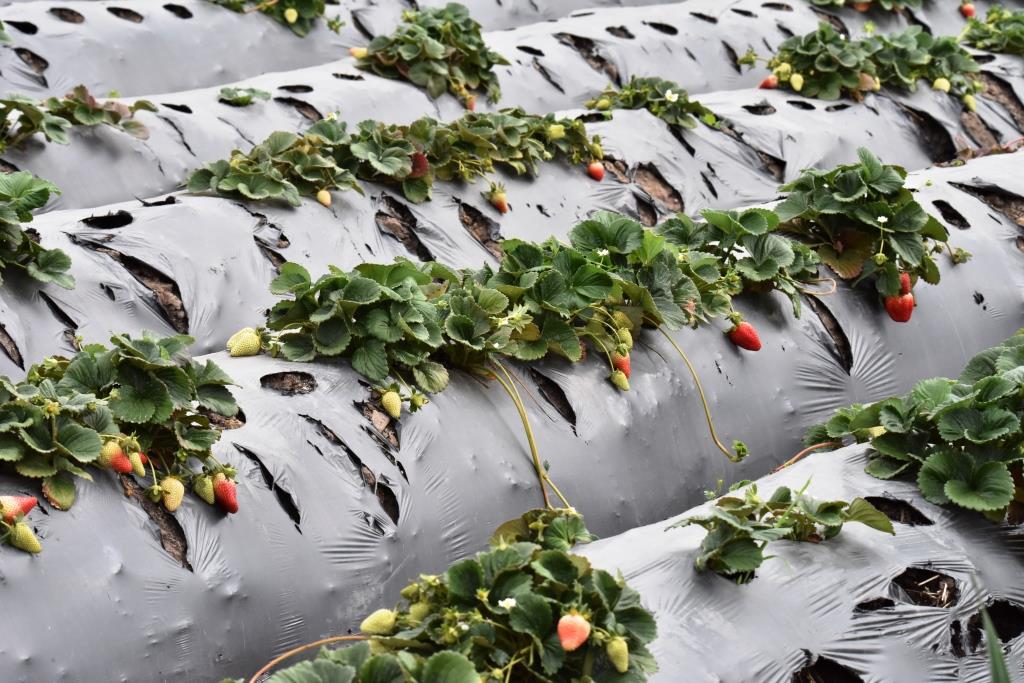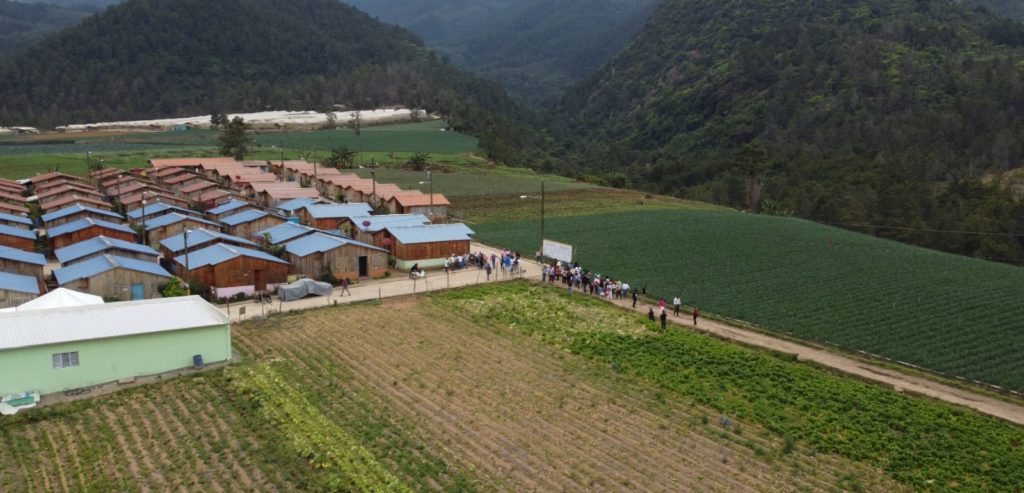The 52 families of smallholder farmers that make up the Villa Poppy Producers Cooperative organized themselves, improved farming techniques and, today, sell their products to the Government, supermarket and restaurant chains.
Dominican Republic, May 5, 2023 – The city of Constanza is located in the Central Cordillera of the Dominican Republic, which is characterized by fertile soil and a climate influenced by winds that move the clouds until they collide with the mountain ranges, causing frequent rains in that region. This municipality has around 60,000 inhabitants and is three hours from the capital.
Constanza is home to a community called Villa Poppy where a group of farming families joined forces to structure a cooperative of smallholder farmers. The 52 families organized in this community of Villa Poppy live and work around the cooperative, which generates income and fostered changes in living conditions. Together, they sought to commercialize their production and increasingly expand access to national markets. .
In 2022, the cooperative, considered a model in the country, obtained the State Supplier Registry (RPE, for its Spanish acronym). It was the first organization of family farmers to obtain such certification in the Dominican Republic. This has allowed them to participate in institutional purchasing programs in the country, since the main purchaser is precisely the Dominican State.

The president of the Villa Poppy Neighborhood Council, Bernardo Díadía, explains that farmers have improved and perfected production techniques and diversified the cultivation of fruits and vegetables such as strawberries, lettuce, potatoes, radicchios, peppers, onions, carrots , among others. The food is consumed in the community and sold to other markets.
“We started taking part in courses, we created a cooperative, and we began to sell without intermediaries to different supermarkets and companies. It is not easy, but we have shown that we can”, explained. According to him, over time the cooperative grew and generated more job opportunities.
Currently, in addition to selling to the Government, the smallholder farmers also direct their production to the private market, including to an international chain of restaurants and several national supermarkets, with stores located in different parts of the country. The members of the cooperative themselves do all the management, from the negotiation to the delivery of the production, which they do with a truck bought by the cooperative.
More than 50 families are integrated into the cultivation of vegetables respecting quality and sustainability standards. There are visits and audits of markets and companies to assess the quality of the products. “Since we got here, our life has improved a lot. We did not have televisions, we did not have refrigerators. Today we even have a truck. We used to sell lettuce for 2 Dominican pesos, and with this support, we can sell for 25 pesos,” said the producer Bernardo.
Miguel Ángel Rosario, president of the Villa Poppy Cooperative, states that the sale of production through institutional purchases has improved the lives of the almost 200 people who live there. “It is an initiative to allow the community to survive through this cooperative.”
he cooperative has financing granted by the Banco Agrícola of the Dominican Republic. It also receives support from other government institutions such as: Ministry of Agriculture, Ministry of Environment, National Institute for Price Stabilization (INESPRE, for its Spanish acronym), among others. It also receives support from other government institutions such as: Ministry of Agriculture, Ministry of Environment, National Institute for Price Stabilization (INESPRE, for its Spanish acronym), among others. On the other hand, it has strengthened infrastructure capacities through the construction and equipping of a packaging center to add value to production, among other types of technical assistance. .
The cooperative also had the support of the family farming program Supérate, a Dominican government institution dedicated to reducing poverty and promoting development. “Our task is to bring farmers in the most sustainable and fastest way so that they can sell directly, ensuring quality, safety and consistency to the market that wants these products,” said Arturo Bisonó, responsible for the program.
The Villa Poppy Cooperative participated in workshops and knowledge transfer on topics such as best practices for cultivation, business plan elaboration, formalization, technical assistance, support for access to public and private markets, among others.
Likewise, public institutions were sensitized to the importance of consuming local products and promoting Dominican family farming. According to Bisonó, the territorial and local sustainability approach was applied, seeking to guarantee the food security of farming families and strengthen associativity and cooperatives.

According to Bisonó, the results obtained are important since smallholder farmers sell directly to supermarkets and restaurants. They are state-certified suppliers and sell to public institutions such as hospitals and are thus prepared to provide products for school meals. “This community is already inserted in the market”, stated Bisonó.
“This community is already inserted in the market”, stated Bisonó. In this sense, he commented on the decree of the Dominican Presidency of the Republic, published in 2022, which instructs public institutions for the process of flexibility to include family farming in the school feeding policy, which will allow the participation of Villa Poppy Cooperative.
The experience in organizing smallholder farmers’ families and the marketing strategy made the cooperative an example for the country, and led to the visit of an international delegation to the city of Constanza to learn about this family farming initiative.
The mission, organized by the project Consolidation of School Feeding Programs, of the Brazil-FAO International Cooperation Program, included participants from 10 Caribbean countries who, for a week, visited the Dominican Republic to learn about the school feeding policy.



